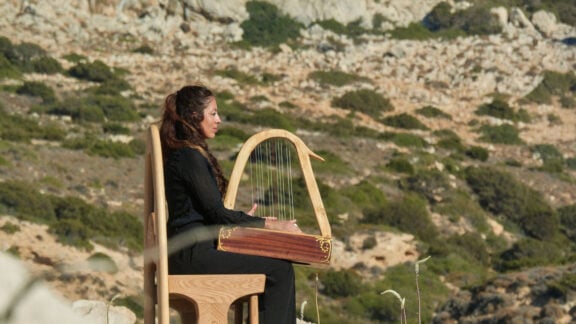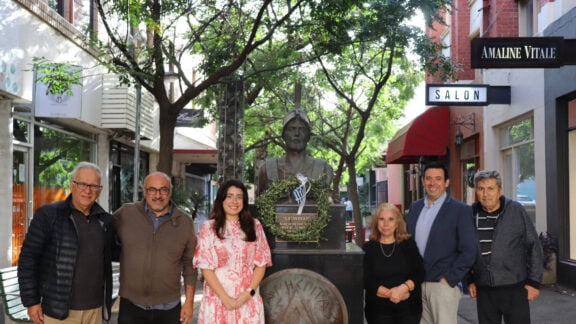The not so well-known story of the Greeks of Tashkent, the vast majority being political exiles following the end of the Civil War in 1949 who created a community in the Uzbekistan capital, was the topic of a most interesting and informative event of this year’s Greek Festival of Sydney.
The talk was given by Costas Politis, President of the Greek Cultural Centre of Tashkent, who came to Australia to address the history of this community and its enduring legacy.
The event took place on Wednesday night at the Greek Community Club in Lakemba, and opened with GOC of NSW President Harry Danalis welcoming the attendees.
It proceeded with speaker Dr Helen Vatsikopoulos, Professional Fellow at UTS and Director of the Greek-Australian Writers’ Festival, who was the driving force behind Politis’ visit to Australia.
Politis then followed Dr Vatsikopoulos as he gave his talk on the subject, noting the impressive manner in which the Greeks that were forced to go to Tashkent following the end of the Greek Civil War in 1949 managed to preserve their Hellenic culture.

“There were about 12,000 people aged 16/17 to 35 that were forced into Tashkent and they were all fighters for the Democratic Army of Greece,” Politis said in his speech.
“Of these exiles, 10,500 had finished primary school at best. When they arrived, they integrated into the Uzbeki/Soviet system, which had an organised social structure.”
The President of the Greek Cultural Centre elaborated on how he has spent the past four years in this role working to preserve the archives and the community itself, and refurbish the centre, so it can stand as a reminder of what the Greek exiles accomplished.
He explained that one part of this was making Cultural Centre a centre of Hellenism open to all and not just its limited members.
“We registered the titles of the land, the building, everything. Everything now belongs to the Greek Cultural Centre.”
“I also went to the cemeteries to make records of Greek people that were buried there. There were about 3000 Greeks buried there going back 40, 50 years. Most of these graves are deserted.”
The event was facilitated by Themi Kallos, executive producer of the SBS Radio Greek language program.
One notable attendee was Fanis Petsinis (in his 90s), who for many years lived in Tashkent and was a pioneer in cultural events, an activity he continued strongly when he moved to Australia in the early 1970s.
Following the event, Politis spoke to Neos Kosmos further on this topic, including how he first came to learn about it.

The expert museologist by trade explained that he was invited to go to Uzbekistan and work there by UNESCO in 2004.
He admitted that he “had no knowledge about the Hellenes of Tashkent” at that time, but that he soon became enamoured with their story and made it a mission to keep their legacy alive by the time he became President of the Greek Cultural Centre in 2020.
The subject is not well-known by many Greeks across the world, something Politis suggested falls down to a failure of the various Greek governments to properly educate people on it.
“In Greece many mistakes have been made from the governments’ side and there is no right history. What we have been taught at schools are things which only scratch the surface of the story,” he told Neos Kosmos.
Politis added that this is one of many pieces of Greek history that is not taught, giving other examples like the Greek history of Central Asia, the Hellenistic kingdoms of Bactria and North India etc.
“This recent history, the Greeks of Tashkent, is not known because simply it is a history that was not serving the narrative of the state and they hid it up,” he said.
He stressed the importance of sharing this history with the youth of today as it is part of what he calls the “Greek miracle”.
“People left from mountains with very little education at a very young age and inside 10-15 years they created culture,” Politis said.
“They were able to showcase their Hellenism and they left a very good impression in the society of Uzbekistan. It is an example of a success story which materialised in central Asia, very far from Greece.”
He built on that further by mentioning the importance of the Cultural Centre in helping the community survive, a story he shared with the Vice-President of the European Commission, Margaritis Schinas, during his visit to Tashkent.
“(Schinas) was impressed by what he saw and asked ‘how did the community survive, especially when there was not even a church’. I replied to him that the community survived because this Cultural Centre was the church of the people,” Politis said.
“The Cultural Centre is a gift left by the older generation who built it with their own hands of those political exiles.”

He discussed the steps they have taken to refurbish the centre and ensure its longevity by turning it into a platform wherein they can share it with the local society of the Uzbek capital.
“I have opened it up and made it a centre for civilisation. The aim is for the centre to shine because Greeks are few, but our mission still stands even if there is only five of us left, to transmit the Hellenic spirit in the local society.”
Politis described all of Hellenism as an organism, stating that all Greeks around the globe are cells that make up the whole and that working together is the key to its survival.
“Hellenism is above and beyond borders. This is what I want to achieve. That is why I consider this move to Australia to be very important. For me, I think this is going to be historical,” he said.
The Greeks of Tashkent is the subject of a photographic exhibition at Luna Studio in Newtown that will be open until 19 May, which is showcasing numerous archived photos taken of the community during their time in the Uzbek city.
This topic will also be featured at the Greek-Australian Writers’ Festival this Sunday 19 May wherein Politis will discuss the subject further with Dr Vatsikopoulos.








